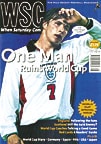 John Sugden & Alan Tomlinson put forward their view of the transition from Havelange to Blatter, who became FIFA president in 1998
John Sugden & Alan Tomlinson put forward their view of the transition from Havelange to Blatter, who became FIFA president in 1998
At FIFA’s 51st Congress in Paris, on the eve of the World Cup finals, Sepp Blatter – the man most responsible for outlawing the tackle from behind – felled Lennart Johansson with a late challenge that Tommy Smith would have been proud of. After a secret ballot, Blatter swept to the FIFA presidency by 111 votes to 80. The result stunned Johansson’s supporters. Only days before they had been confidently predicting a comfortable victory for the man who for the past four years had been tirelessly promoting a campaign to reform FIFA based on principles of democracy and transparency.
Unfortunately for Johansson, democracy and accountability are alien principles to most of the 191 delegates entitled to vote. When, flanked by jogging, dark-suited bodyguards, the armour-plated limousine of Saudi Arabia’s Prince Faisal bin Fahad nosed its way through the gates of the Equinox convention centre, one wondered how he would get his head around the principle of one person, one vote. In FIFA, all eligible national associations have one vote and each is equally valued – Germany and Brazil have no more weight than FIFA’s newest members such as Palestine and American Samoa. It is through the manipulation of this system and the husbandry of the third world vote that the South American confederation (Conmebol), with only ten members, has been able to control FIFA for the past quarter of a century
During the count, João Havelange, the outgoing president of 24 years, gazed down approvingly from the tribune as the piles of ballot papers accumulated in favour of his protégé and former employee, the Swiss general secretary of FIFA, Sepp Blatter. On the surface this may have looked like Europe regaining its ascendancy. In fact, Blatter had been hand-picked to work his way up FIFA’s totem pole by the late Horst Dassler, the key architect of the Adidas empire and the man who established ISL (Information, Sport and Leisure), the marketing agency which has virtually monopolized the media and sponsorship deals of FIFA and the International Olympic Committee for the past two decades.
Dassler spotted Blatter when he was an executive of Sports Timing in Switzerland. Dassler took Blatter to Landersheim, Adidas’s secretive executive training school, before placing his recruit in FIFA where he married the daughter of the general secretary, Helmut Kaser, then took over his father-in-law’s job. Blatter was soon divorced and bedded in as Havelange’s chief of staff.
Blatter formally entered the race for the presidency earlier this year and only a week before the April 7th deadline. He was openly criticized by many FIFA executive committee members for using his position as general secretary as a campaigning base for an undeclared bid for his master’s throne. Then, as Blatter’s campaign gained momentum, the same voices called foul over the manner in which both Blatter and Havelange travelled the world in executive jets provided by allies in the Arabian Gulf and backed with resources from Swiss-based business partners.
The suspicion was that they were promising rewards and favours for votes. This tactic had worked for Havelange in 1974 when he ousted England’s Sir Stanley Rous, and it was set to work again as some of those who had pledged their support to Johansson wavered. Significantly, Blatter and Havelange campaigned longest and hardest in the impoverished quarters of South-East Asia, Eastern Europe and, most notably, Africa. This was viewed as a blatant attempt to undermine the alliance between Johansson’s UEFA and Issa Hayatou’s African Confederation (CAF), which held the balance of power with more than 50 votes.
England’s highly public last-minute defection to the Blatter camp was a further blow to Johansson’s rocking campaign. Clearly, this was directly related to the English FA’s hopes of staging the World Cup finals in 2006. Along with 49 other members of FIFA, England had signed a letter promising support for the Swede. Once the cradle of football tore up their covenant, it was easier for other nations to abandon their pledges to Johansson. Shamefully, and not for the first time, in the FA’s calculations getting the World Cup was worth more than keeping promises and being a good European player.
Even with the game running away from him, the night before the elections Johansson believed he had enough votes to win. However, as he prepared for bed in Paris’s Le Bristol, the favoured hotel of the FIFA executive and its guests, he was disturbed by his aides who told him that across the Seine, at the Montparnasse Meridien, where all the national associations were accommodated, Blatter supporters from the Gulf were working the corridors. Johansson’s supporters sped across Paris to try to prevent a haemorrhaging of their vote but, as one insider put it, “it was too late, it had become a tidal wave”.
Perhaps Blatter, with his smooth politician’s manner and his multilingual stage skills, won because he is the best man for the job, but we doubt it. It is equally likely that the continuity candidate prevailed because Johansson’s collectivist ideals simply proved to be less appealing than patronage and personal gain.
At his post-election press conference, when asked about rumours of vote buying, Blatter responded smugly by saying “the match is over”. Indeed, inside the FIFA club, solidarity and silence soon replaced outspoken outrage among the losers. However, outside the gates, there may still be enough people who, in the words of the FIFA motto, “care about football” enough to carry forward the investigation. This game may be longer than Blatter thinks.
From WSC 138 August 1998. What was happening this month